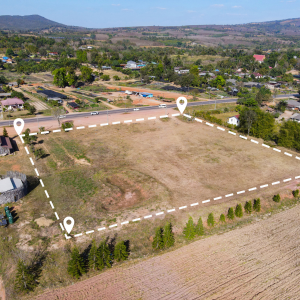
Understanding the Legal Process of Gifting Land in Georgia

If you want to give land to a family member in Georgia, you have to follow a number of legal steps to make sure the transfer goes smoothly and is legal. The first step is to write a deed, which is usually a quitclaim deed or a warranty deed. The deed must clearly name the property and the people who are transferring it.
It’s very important to have this deed done correctly and signed, and you may need the help of a lawyer to make sure it follows Georgia’s real estate laws. To prove that the deed is real, the grantor, or current landowner, should sign it in front of a notary public.
When the deed is signed, it has to be recorded at the county clerk’s office where the property is located. This step makes sure that the new ownership is shown in public records and helps keep future disagreements from happening.
It’s also important to know what the possible tax effects are. Georgia doesn’t have a state gift tax, but if the value of the property is above certain levels, federal gift tax rules may apply. Getting advice from both legal and financial experts can help you understand these complicated issues and avoid problems that could happen during this important deal.
Evaluating the Fair Market Value of Property Before Gifting
When giving land to a family member in Georgia, determining its fair market value is critical in the real estate transfer process. This value is calculated by considering a variety of factors such as location, size, current market conditions, and comparable sales in the area.
Accurate valuation ensures tax compliance while minimizing potential disputes or financial liabilities. A professional appraiser can provide an unbiased assessment that reflects true market conditions, which is necessary for both federal gift tax and state-level property assessments.
Gaining a clear understanding of the fair market value is essential for determining potential capital gains tax implications if the recipient chooses to sell the property. Maintaining thorough documentation of the valuation also ensures compliance with future financial and legal obligations tied to the transaction. In some cases, working with cash land buyers in Georgia and surrounding states can simplify the process, especially when quick sales and accurate valuations are priorities.
Financial Considerations Before Gifting Real Estate to Family Members
When considering giving land to a family member in Georgia, it is critical to understand the financial implications. One major consideration is the potential tax implications.
Georgia does not have a state gift tax, but federal laws still apply. This means that if the land’s value exceeds the IRS’s annual exclusion limit, which changes on a regular basis, you may be required to file a gift tax return and potentially pay federal gift taxes.
Furthermore, giving property can affect the recipient’s future capital gains taxes. If the recipient sells the property at its increased value, they may be subject to significant capital gains taxes due to inheriting the original cost basis.
It’s also important to consider any outstanding mortgages or liens on the property, which can complicate the transfer process and financial obligations for both parties. Consulting a tax professional or attorney with experience in Georgia real estate law can help ensure compliance with legal and financial requirements when gifting land within your family.
Tax Implications of Transferring Property to Family Members in Georgia
When you give property to a family member in Georgia, there are a number of important tax implications that you need to think about carefully. When you give someone land, it’s important to know how it might affect both federal and state taxes.
The IRS lets you give away a certain amount of property each year without having to pay federal gift taxes. But if you give away more than this amount, you may have to file a gift tax return. Also, when you give someone property, they take on the donor’s cost basis, which can affect capital gains taxes later on.
If the property is sold later for more than it was bought for, this could mean a lot of capital gains tax. Georgia doesn’t have a state-level gift tax, but it’s important to think about how these kinds of transfers could affect estate planning and future estate taxes.
Getting help from a real estate lawyer or tax expert who knows Georgia law can help you understand these complicated rules and make sure you follow all of them.
Exploring Gift Deed vs Quitclaim Deed for Family Land Transfers
When giving land to a family member in Georgia, understanding the distinction between a gift deed and a quitclaim deed is critical for a smooth real estate transaction. A gift deed is specifically designed to transfer ownership of property without the exchange of money, making it ideal for giving land to relatives.
To be legally binding, the documentation must be clear and outline the donor’s intent to gift the property. It must also be notarized. A quitclaim deed transfers the grantor’s interest in the property, but does not guarantee a clear title. This can be beneficial in family situations where property boundaries and interests are already established.
Both deeds have significant tax implications; while neither may result in immediate tax liabilities under federal gift tax exemptions, they must be carefully considered for potential future capital gains taxes based on the property’s assessed value at the time of transfer. A real estate attorney or tax advisor can guide you through the land transfer process, ensuring compliance with Georgia state laws and optimizing tax strategies for both parties.
Essential Documents Required for Land Transfer in Georgia
In order to guarantee that the transfer of land to a family member in Georgia is legally binding and recognized, it is necessary to complete a number of essential documents. The deed is the primary document that is necessary, as it is the official record of the transfer of ownership.
In Georgia, a warranty deed or quitclaim deed is typically employed, depending on whether the objective is to ensure a clear title or to transfer any interest in the property. Before submitting the deed to the county clerk’s office in the location of the land, it is essential that it be accurately prepared and notarized.
Additionally, you must submit a completed PT-61 form, which is the real estate transfer tax declaration required by the state. This form, submitted along with the deed, provides important details about the transaction. For guidance on navigating this process smoothly, Fast Land Offers can help ensure all paperwork is completed accurately and on time.
Other documents, such as affidavits, prior deeds for reference, or proof of identity, may also be required to facilitate a smooth transfer, depending on the specific circumstances. It is possible to prevent potential disputes or complications related to property titles in future transactions by ensuring that all paperwork complies with Georgia’s legal requirements.
Step-by-step Guide to Gifting Real Estate to Relatives in Georgia
There are a few important steps you need to take to make sure the transfer goes smoothly and to understand the tax consequences of giving property to a family member in Georgia. First, you need to make sure you really own the property by checking the title and getting rid of any liens or encumbrances.
Next, write a deed, which is usually a quitclaim deed or a warranty deed. This document should include the legal description of the property and officially transfer ownership from you to your relative. It is best to talk to a real estate lawyer during this process to make sure everything is correct and legal.
Both parties must sign the deed in front of a notary public to make it official. After you have the deed notarized, you need to file it with the county recorder’s office where the property is located. This makes the transaction public and updates the property records.
If you want to give someone property, you should talk to a tax advisor about possible gift taxes. If the value of the property is higher than the federal gift tax exclusions, you may need to file IRS Form 709. Also, keep in mind that Georgia’s reassessment rules could change how much you pay in property taxes if you do this.
If you follow these steps carefully, you can give land as a gift without breaking any state laws or tax rules.
How to Properly Execute a Gift Deed Without Future Complications
In Georgia, transferring land to a family member through a gift deed requires careful attention to detail to avoid problems down the road. First, it’s important to write a clear and accurate gift deed that has all the important information about the property, the person giving it, and the person receiving it.
This legal document should clearly say that the land is being given as a gift with no money changing hands. To make sure you follow Georgia law and have the right paperwork, it’s best to work with a real estate lawyer who knows Georgia law.
To make sure the gift deed is real, both parties must sign it in front of a notary public. After you have it notarized, you need to quickly file the deed at the county recorder’s office where the property is located so that it is legally binding and a public record.
It’s important to know what the tax consequences might be because giving land as a gift could mean paying federal gift taxes or losing Medicaid eligibility for long-term care. Talking to a tax professional can help you understand how lifetime gifting limits might affect your money.
If you follow these steps carefully, you can avoid future arguments over who owns what or who owes what in taxes. This will make it easier for your family to pass on property rights.
Legal Requirements for Recording a Gift Deed in Georgia

It is critical to be aware of the Georgia statutes governing the recording of gift deeds when transferring property to a relative. The validity of the transfer depends on the accuracy of the gift deed, which includes clearly identifying the giver and the receiver.
The absence of monetary consideration should be clearly stated in the deed to differentiate it from a sale transaction. A complete legal description of the property must be included in the document to ensure clarity.
To be valid in Georgia, a gift deed needs to be signed by both parties and then witnessed by a notary public. After careful execution, the deed must be submitted to the superior court clerk in the county where the property is situated.
To avoid any potential title disputes or claims in the future, it is important to update public records to reflect the change in ownership. When deciding how to handle the taxes on a gift of real estate in Georgia, it’s wise to research the laws of the state and any possible exemptions or consequences.
Navigating Inheritance and Estate Taxes on Gifted Property
If you want to give land to a family member in Georgia, you need to know how inheritance and estate taxes will affect the land you give them. Georgia doesn’t have its own state-level estate tax, but if the total value of your estate, including the land you gave away, is above certain IRS thresholds, the federal estate tax may still apply to your transaction.
It’s important to remember that giving someone property while you’re still alive could affect the capital gains taxes they have to pay in the future. The family member who gets the gift will have the same original cost basis as you did. This means that any increase in value since you bought it could be taxed as capital gains when you sell it.
Using tools like a quitclaim deed can simplify the process of transferring property ownership. Still, it’s always wise to consult a real estate attorney or tax professional to ensure you’re meeting all legal and financial requirements. Understanding these details can help you avoid unexpected tax liabilities and ensure both parties are clear on their responsibilities during the transfer. If you’re exploring alternatives, here’s how Fast Land Offers can help guide you through a stress-free property solution in Georgia.
Impact of Gifting Land on Medicaid Eligibility for Seniors
When giving land to a family member in Georgia, especially for seniors considering Medicaid eligibility, it is critical to consider the potential impact on their benefits. Medicaid has strict asset and resource limits, so transferring property may affect eligibility.
For seniors considering applying for Medicaid long-term care services, gifting land may be interpreted as a transfer of assets for less than fair market value. This could result in a penalty period where they are ineligible for Medicaid benefits.
The penalty is calculated by dividing the gifted property’s value by Georgia’s average monthly nursing home care cost. To ensure compliance with regulations and avoid unintended consequences, it’s important to carefully plan such transfers with the help of an elder law attorney or financial advisor specialized in Medicaid planning.
Understanding these rules can protect seniors’ access to essential healthcare services and their families’ inheritance rights.
Understanding Capital Gains Tax on Gifted Property Sales
When you give land to a family member in Georgia, it’s important to know how capital gains tax will affect future property sales. When figuring out how much capital gains tax to charge, the IRS treats properties that were given as gifts differently from properties that were bought.
The “basis” is the original purchase price, and it becomes the basis for the person who gets the gift. So, if you bought the land for $50,000 and its value goes up to $150,000 by the time you give it to someone, they will get your original $50,000 basis.
They have to figure out capital gains based on this inherited basis when they decide to sell the property later for a higher market value. If the property’s fair market value at the time of the gift is lower than what you paid for it, special rules may apply that could change how gains or losses are figured.
It’s best to talk to a real estate lawyer or tax professional who knows Georgia’s real estate laws to help you deal with these tax issues. Knowing these details can help you avoid unexpected tax bills and make the transfer go smoothly for both parties.
Can You Gift Land in Georgia?
Yes, you can give away land in Georgia, and the process entails several important steps and considerations. Giving land to a family member is a legal real estate transaction that necessitates meticulous attention to detail.
First, ensure that the land title is free of any liens or encumbrances. To officially transfer ownership, prepare a deed transfer document, such as a quitclaim deed or warranty deed.
To make the gift legally binding, you must have this document notarized and recorded with your local county recorder’s office in Georgia. In addition to understanding the real estate transfer process, it is critical to consider the tax implications of giving away land in Georgia.
The Internal Revenue Service (IRS) has specific rules for gift taxes, and while Georgia does not have a state-level gift tax, federal regulations apply. If the value of gifted land exceeds federal limits, it may be necessary to file a gift tax return.
When gifting property in Georgia, consulting with a real estate attorney or tax advisor can help you navigate the complexities and ensure that you meet all legal requirements.
What Is the Best Way to Transfer Property to a Family Member?
When transferring land to a family member in Georgia, it’s essential to understand the legal process and potential tax obligations that may arise. A quitclaim deed is often a preferred method, as it allows for a quick transfer of ownership without providing extensive warranties. In some cases, partnering with Georgia cash buyers and other states in the United States can also be a practical option for those who want a faster and more straightforward solution.
To complete the process, a quitclaim deed must clearly identify the grantor and grantee, accurately describe the property, and be signed and notarized. To ensure that the transfer is legally recognized, the deed must be recorded at the county recorder’s office where the property is located.
It’s also a good idea to speak with a real estate attorney or tax professional about any potential tax implications of gifting land. The Internal Revenue Service (IRS) establishes an annual gift exclusion limit, which should be considered when transferring valuable assets like real estate.
Understanding these legal and financial aspects ensures a smooth transfer of property ownership while reducing both parties’ tax liabilities in Georgia.
How Do You Transfer Property Title to a Family Member in Georgia?

Transferring property title to a family member in Georgia requires adherence to several important steps, and it is essential to comprehend the legal requirements involved. Initially, it is essential to prepare a deed, commonly a warranty deed or quitclaim deed, which facilitates the legal transfer of property ownership.
Including precise information regarding the grantor and grantee, along with a detailed description of the property being transferred, is essential. After the deed is prepared, it is essential to have it signed in the presence of a notary public to guarantee its validity.
Following notarization, the subsequent step involves filing the deed with the county clerk’s office in the county where the property is situated. This recording process acts as an official notification of the ownership change and safeguards the interests of both parties involved.
Please note that although transferring land as a gift may not result in immediate tax liabilities due to certain exclusions on gift taxes, it could have repercussions for capital gains tax if the recipient chooses to sell the property in the future. Engaging with a real estate attorney or tax advisor can assist in addressing any intricate matters concerning Georgia’s real estate regulations and tax policies.
Grasping these steps facilitates a seamless transfer of property title among family members, adhering to the regulations set forth by the state of Georgia.
Can You Gift an Acre of Land?
Yes, you can give an acre of land to a family member in Georgia by following the correct legal procedures for real estate transfers. To legally transfer ownership of the property, a deed, typically a quitclaim or warranty deed, is drafted.
It is critical to ensure that the deed is properly executed and recorded at the county recorder’s office where the land is located. When gifting land, keep in mind the potential tax implications, such as gift tax requirements.
In 2023, federal gift tax laws allow individuals to give up to $17,000 per recipient without incurring a gift tax. However, it’s important to consult with a tax professional to understand any state-specific taxes or exemptions in Georgia. Furthermore, ensuring that the property has no outstanding liens or encumbrances before transferring it can help avoid future legal issues.
Properly completing these steps will ensure a smooth and legal transfer of land within your family.
Helpful Georgia Blog Articles
- Can You Sell Land if You Owe Taxes in Georgia
- Can You Sell Land if You’re in Foreclosure in Georgia
- How to Sell Inherited Land in Georgia
- How to Find Out Zoning of My Land in Georgia
- Paperwork for Selling Land by Owner in Georgia
- How to Sell Land Without an Agent in Georgia
- How to Sell Land With a Lien in Georgia
- How to Sell Land with Mineral Rights in Georgia
- How To Gift Land To A Family Member In Georgia
- Effective Strategies For Quickly Selling Land In Georgia’s
- Mastering The Art Of Selling Land At Auction In Georgia’s
- Comprehensive Guide To Drafting A Land Sales Contract In Georgia

| LEVIES | TAX-EXEMPT STATUS | QUIT CLAIM DEED | INVESTMENT ADVISER | FINANCIAL ADVICE | WEALTH |
| SMARTASSET | PAYEE | PAYMENT | TRUST | LIVING TRUSTS | IRREVOCABLE TRUSTS |
| TAX BENEFITS | DEDUCTION | TAX DEDUCTION | TAX PLANNING | REAL PROPERTY | REALTY |
| MONIES | THE STATE OF GEORGIA | STATE OF GEORGIA | LEGAL SERVICES | CHILDREN | CHILD |
| U.S. | THE UNITED STATES | STOCKS | RISKS | QUALIFIED PERSONAL RESIDENCE TRUST | QPRT |
| POLICY | INVESTMENTS | INVESTING | INSURANCE | GUARANTEES | CONTRACT |
| BENEFICIARY | WILLS | WARRANTY DEEDS | TAX BURDEN | PROMISE | NEWSLETTERS |
| LIFE INSURANCE | LIFE INSURANCE POLICIES | HEIRS | FIDUCIARY DUTY | FIDUCIARIES | INBOX |
| THE ANNUAL GIFT TAX |